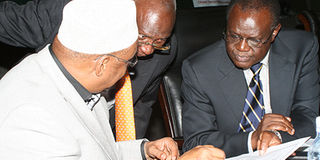Ministry says power cuts to end in September

Energy minister Kiraitu Murungi (right) confers with assistant minister Maalim Muhamud (left) and permanent secretary Patrick Nyoike at a past forum. Mr Muhamud told Parliament that the ongoing power rationing would end in September August 17, 2011. FILE
The ongoing power rationing is likely to be discontinued in September, the Energy Ministry has told Parliament.
Assistant minister Maalim Muhamud said the move would be made possible by the installation of additional power generators at Muhoroni and Embakasi and prudent management of water at the hydropower dams.
Mr Muhamud said 40 Megawatts (MW) of emergency power capacity would be installed at Muhoroni by September while a further 50 MW will be installed at Embakasi, bringing the total there to 110 MW.
“With installation of this capacity and prudent management of water in our hydropower dams, power rationing is expected to be discontinued by September 2011,” said Mr Muhamud.
The assistant minister said the government is in negotiations with the African Development Bank for a Sh8 billion loan, which will be largely used to finance the drilling of geothermal production wells.
He said the current situation has been caused by outages affecting key generation units, among them the installation of a 60MW gas turbine whose installation in Nairobi has been delayed by more than nine months.
One of the two 30 MW turbines is to be commissioned this week while the second is to be in place by the end of this month, said Mr Muhamud in a statement to Parliament.
A 53-MW generator at Turkwel Gorge has been out of service for maintenance since June, said the assistant minister, and is expected to be in service this week.
He said the outages have also been caused by the inconsistent generation of 26 MW of power at Mumias, which has been going on and off for a long time.
“The impact of these outages is more severe in West Kenya, where both Turkwel and Mumias are located, while the connection of West Kenya to the rest of the national grid is inadequate,” he added.
The result of this inadequate connection is that even when there is available power from outside the region, voltages are insufficient to provide enough power, thus the perpetual rationing.
But MPs doubted the minister’s explanation, with Ekwee Ethuro (Turkana Central, PNU) alleged that cartels in the oil sector have held the government hostage and continue to dictate oil prices, thus the high cost of power due to the thermal generators.
The MP insisted that a group of private investors who allegedly bought 30 per cent of shares in are the Kenya Electricity Generating Company (KenGen) controlling power wells it has drilled.
But Mr Muhamud said the wells are under the control of Kengen and not private individuals are earlier alleged denied the allegations, saying the government is now keen to generate alternative sources of power, with a focus on geothermal power.
He said Kenya Power had factored in an element of exchange rate in the power bills to help the firm settle its obligations to independent power producers. He added that both KenGen and Kenya Power have to service loans that had been borrowed and are repaid in their original currencies hence the adjustment in foreign exchange to help the firms meet the payments.
The assurances came a few days after Energy Permanent Secretary Francis Nyoike warned Kenyans to brace themselves for higher electricity charges should the shilling weaken further against major international currencies.




